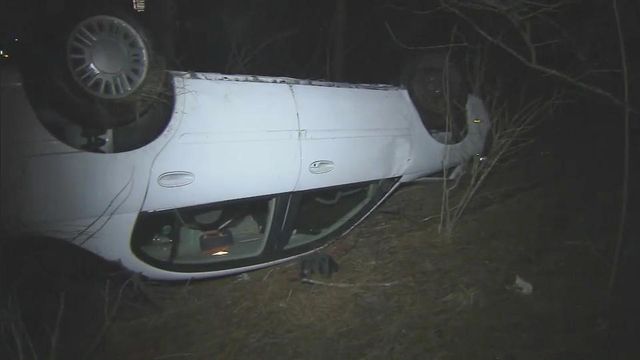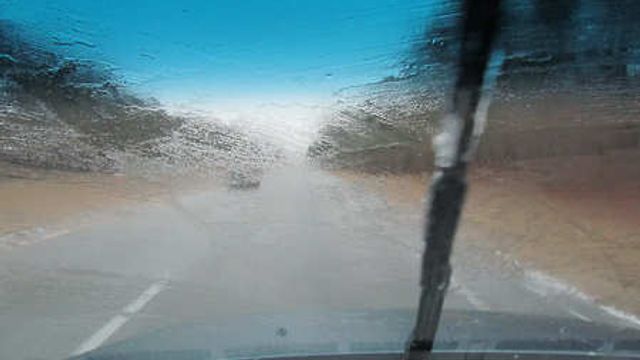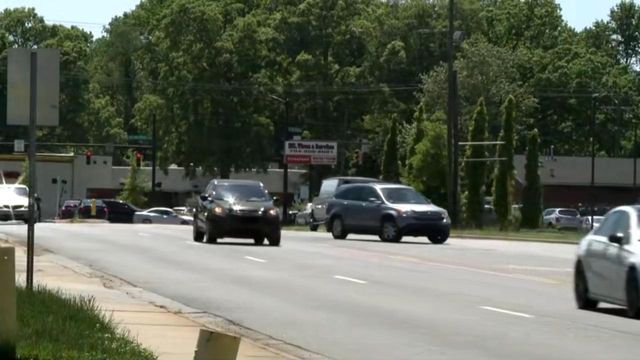Icy roads remain a threat through morning
The snow, sleet and freezing rain that caused chaos on area roadways Friday will have all night to solidify, keeping travel tricky through the morning hours.
A DOT spokesman said he worried that the freezing rain that fell Friday afternoon had washed away some of the brine crews hoped would keep the roads passable.
Although the storm system had moved out of the Triangle by early evening, the bitter cold promised to freeze any moisture on the roads. As night falls, road crews will transition to treating trouble spots with a sand and salt mixture and will return to pure salt only as temperatures rise.
Officials called on residents to stay off the roads until late Saturday morning, when rising temperatures should melt the remaining ice.
"We do want to encourage people to be very, very careful on what are anticipated to be very slick roads throughout North Carolina," said Gov. Pat McCrory, who canceled his Friday evening schedule. "We don't want to see anyone take any risks."
Crashes galore from Friday's frozen precipitation
Luis Mondragon was especially unlucky. He crashed his car twice along Raleigh's Old Stage Road. First, he slid into a ditch. As his friends pushed the car back into the travel lanes, with Mondragon in the driver's seat, another car slid into his.
His friends barely missed being hit.
"They jumped because they were beside the road trying to get the car out and they said, 'Yo get out of the way,'" he said.
The group had to wait hours for help, and their ride also battled the slick surface.
At one point there were five active accidents on Interstate 95 Friday evening. The highway was closed in both directions from about 4 p.m. until after 6 while crews tended to the injured and cleared the vehicles involved. Many cars spun, slid and flipped, but no serious injuries resulted.
Helen Crosland was headed north from Dillon, South Carolina when she started to slide. "My car turn and hit the rail – bam," she said. Then another car began to slide toward her.
In all, five vehicles would slide off the road at the same location, one after another.
"It was just smooth," Crosland said of the road surface.
First Sgt. Jeff Gordon, a spokesman for the patrol, said all the major highways in the Triangle saw some trouble spots, and that almost 200 accidents were reported Friday by 8 p.m. in Wake County. The highest volume was between 2 and 4 p.m. as people tried to get home and a second wave of freezing rain fell.
Joseph Coggins, working for Mangum Towing, stayed plenty busy in Rocky Mount. "The later it gets, things are going to start freezing over. The only thing I can say is people just need to slow down, take their time, everything will be all right," he said.
At the North Carolina Department of Transportation headquarters in Raleigh, crews returned time and again to re-stock on ice-melting salt and sand for traction.
A school bus carrying 21 elementary students slid off snow-slicked Fox Road in Wake County and into a tree Friday afternoon. Two of the students on the bus, which departed from North Ridge Elementary School, were taken to an area hospital with minor injuries, according to a spokesman for Wake County schools.
"We slid and hit the mailbox and got into a bad crash," said Reagan Carpenter, who was riding the bus at the time.
For those with no choice but to drive, authorities offered the following guidelines:
Drive only if necessary
- Clogged roadways can make it difficult for snow-removal crews and emergency personnel to do their jobs.
- Make sure your cell phone is fully charged.
- If you don't have a garage or carport, parking near a wall or building can protect your car from the cold to some degree.
- Check the power levels and water in your car battery. If your car is not housed in a garage, it is crucial to have a heating system for your engine if there are extremely low temperatures for long periods.
- Keep your gas tank filled. Doing so will keep condensation from getting in the tank. Condensation can contribute to fuel line freeze-up.
- Make sure your exhaust pipe is not clogged with mud or snow.
- Check the antifreeze levels in your car and the firmness of hoses.
- Let the vehicle run for a few minutes before driving. This will allow the transmission and power steering fluids and motor oil to circulate.
- If you must drive on snow- or ice-covered roadways, lower your speed. Driving at the regular speed limit will reduce your ability to control the car if you begin to slide. Leave plenty of room between you and other vehicles.
- Don’t use cruise control on icy roads.
- Allow more time for braking when visibility is poor or roads are slick.
- Stay calm if you start to skid.
- Wear multiple layers of thin clothing, instead of a single layer of thick clothing to stay warm. You will be warmer, and as the temperature changes, you can easily remove layers to remain comfortable.
- If conditions worsen and you can no longer drive safely, pull off the highway. Stay calm, and remain in your vehicle. Do not set out on foot unless you can see a nearby building where you know you can take shelter.
Carry emergency supplies
Keep an emergency kit in each vehicle for use if you get in a crash or are stuck in wintry weather.
Each car should have:
- Jumper cables and flares
- Spare tire
- Hazard triangle/road flares
- Flashlight with extra batteries,
- Tire repair kit and pump
- A bag of cat litter (for tire traction)
- Windshield scraper and brush
- Extra clothing warm clothing or a blanket
- First aid kit
- Maps
- Water
- Nonperishable, high-energy foods such as granola bars.
- Use cellular phones sparingly, emergency personnel cannot communicate if the channels are clogged with unnecessary chatter.
If you start to slide
- Stay calm in a skid
- Make sure everyone is safe. Check for injuries and make sure no one needs medical assistance.
- Turn on your hazard lights or light flares, and pull off the highway, if possible.
- Call 911 to report the incident.












